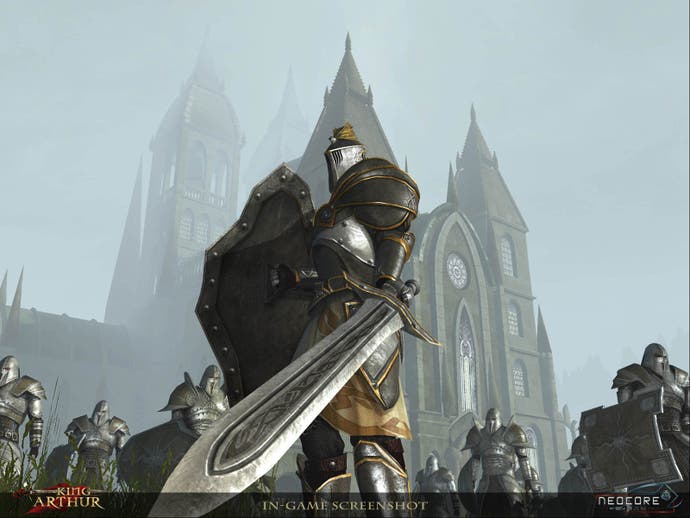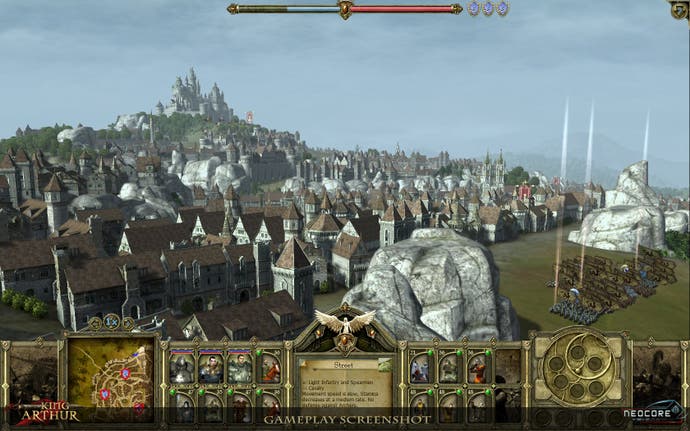King Arthur: The Role-Playing Wargame
Round table discussion.
It's the 5th Century. Or maybe it's the 6th. Nobody can really be sure, and it doesn't matter - the legendary tales of King Arthur might as well have taken place in another universe. Wizards, warriors made of supernatural gas and magical swords knocking about - it's a rich, slightly stuffy slice of unhistory that's been completely owned and dominated for 35 years by a Monty Python movie. At least, in this moron's head - you might be more educated.
Describing King Arthur, the Total War series is the most obvious, well-worn and apt comparison. But in limiting our tale to Britannia, we're presented with a more intimate game, a welcome break from fully-zoomed-out global concerns. A childhood spent playing Defender of the Crown taught me that England and Wales were a manageable prospect for conquest, so this didn't feel daunting. I was wrong to feel confident. My diet for a few days has consisted mainly of my own arse, roughly handed to me.
Arthur's game, as the death of his dad Uther Pendragon nudges him closer to the throne, starts tucked away in the tutorial fields of Cornwall. Excalibur is rusting in a lake in the West Midlands, but this is a nice little pocket of England serves as an introduction to the game basics.
With none of the later game's town or troop management, strongholds, or morality to worry about, say hello to your units - infantry, knights, spearmen, cavalry and archers. Later on we'll discover supernatural equivalents, and fight wolves and giants - but for now, it's strictly human.

A huge amount of effort has been put into the visual polish of the world and battle maps, and the background music is fantastically well-judged - both pleasant and easy to ignore. This vision of an agricultural and mythical Britain as it cycles through the seasons is clearly the result of dedication. Love, even.
It's a shame that the zoom makes it less pleasurable to roam around - the smaller size of the world map has led developer Neocore to limit the zoom, making it all feel a bit claustrophobic. On the battle maps, however, the changes in zoom level actually move you up and down, which is incredibly unhelpful if you're trying to keep track on a certain unit. Neocore has introduced a keyboard shortcut for tracking selected units, but that feels like a workaround.
So, we set about the slow domination of Britannia, which involves the most controversial aspect of King Arthur. At first release, Arthur's huge RTS battles were a troubling King: punishing and often unjust. There have been tweaks since: the introduction of Beginner difficulty in patch 1.02 was a begrudging concession - they might as well have called it "Canst Thou Changeth My Nappy Mode" - but the overpowered units have been slowly fixed too, with Samhain armies becoming considerably less invulnerable, and archers getting a nerf checkbox.

That was an odd approach - giving you the option to fix overpowered units. This is still a very hard game, but if you're patient, a gifted and forgiving strategist, or can stomach playing on the easiest settings, you'll make progress. I won't tell you which one I am, because crap doesn't stop me being proud.
Just don't trust the auto-battle option - Creative Assembly will say that you'll suffer around a 5 per cent penalty for not micromanaging your taxes and battles in Total War, but Neocore is less forgiving in King Arthur. When I declined to take a hands-on role in my troops doings, they were decimated. Replacing troops is expensive and counter-intuitive. In fact, if you feel you've lost too many troops, it's probably best to go back and play the battle again, as the hamstringing effects are felt deep - too deep - into the game.
This is how it works: every map has Victory Points, the importance of which are emphasised by the opening camera, which swoops around them like a dramatic and informative eagle. These points are claimed by simply being around them, and depending on what they are they'll bestow a power on nearby units. A long fence is useful for Archers, allowing you to sling out a rain of arrows. A church, meanwhile, will heal your nearby soldiers, because this is the 5th Century, when religion apparently worked.








